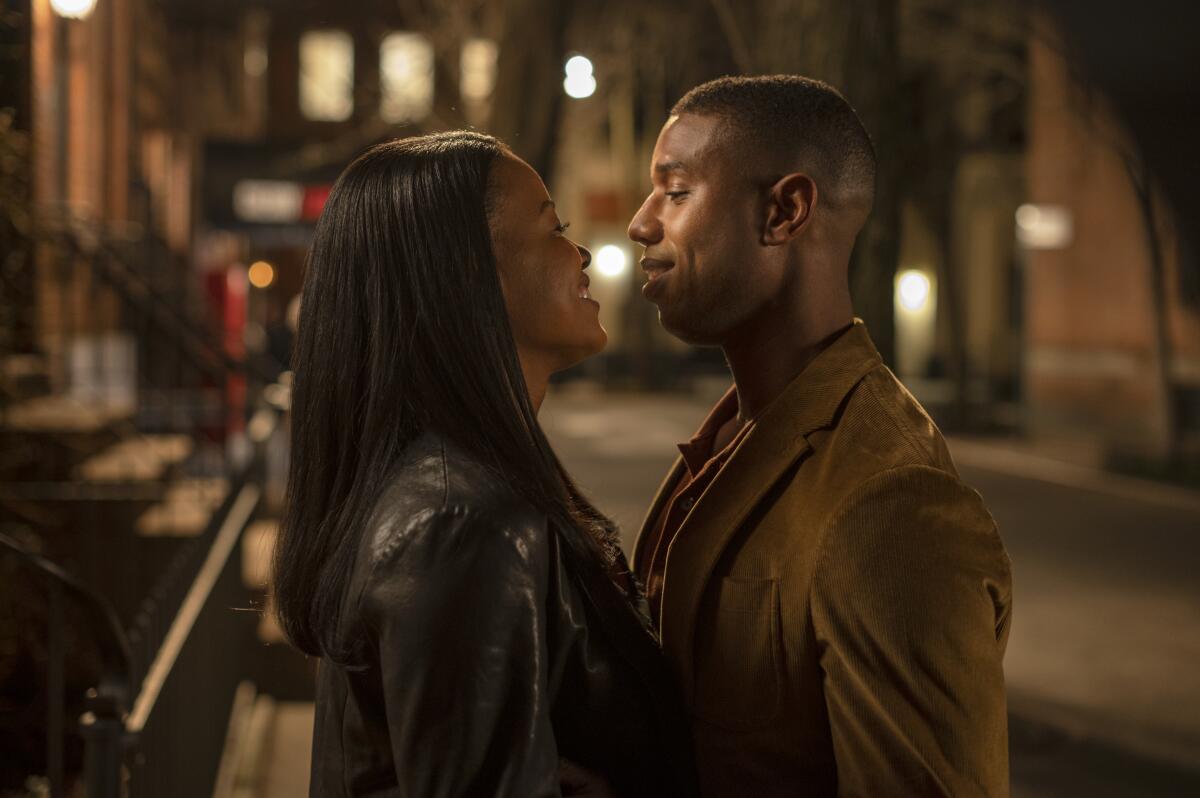Review: Michael B. Jordan’s ‘A Journal for Jordan’ could use more conflict

The Los Angeles Times is committed to reviewing new theatrical film releases during the COVID-19 pandemic. Because moviegoing carries inherent risks during this time, we remind readers to follow health and safety guidelines as outlined by the CDC and local health officials. We will continue to note the various ways readers can see each new film, including drive-in theaters in the Southland and VOD/streaming options when available.
Acceptance is sometimes the only way forward after trauma. Then there’s acceptance in a dramatic sense, as in “I really want this but I’ll just accept that I can’t have it” or “I’ll accept what I’ve been told, however dubious.” That can sap a story’s tension — or worse, pay lip service to important questions.
The Denzel Washington-directed “A Journal for Jordan” is based on a diary of a father’s thoughts written for his son just before the father died in the second Iraq War and on the mother’s memoir of her romance with the father, written presumably to help her and her son move toward acceptance of their loss. Despite the title, the father’s words turn out to be a minor element; they only come into play late in the film and with unsettling resonance. The film is mostly about the relationship of Dana Canedy (Chanté Adams), then a New York Times reporter, and Charles M. King (Michael B. Jordan), an Army drill sergeant.
Their relationship develops slowly due to Dana’s tight-fisted control, influenced by her father’s infidelity. The interplay between Dana and Charles is where the magic’s to be had: In this screening, viewers emitted enthusiastic noises at the appropriate moments — such as when Dana’s face initially registers Charles’ hotness, or when he stands before her shirtless and she says, “You better put all that away.”
Michael B. Jordan delivers a likable, if stoic, Charles. But the film’s portrait is scrubbed so clean, he’s too good to be true. He’s the very picture of the honorable soldier, devoted to his recruits, silently coping with his wartime experiences. He draws and paints. He patiently waits for Dana to allow their next bit of progress, never displays frustration and, by the way, looks like Michael B. Jordan. Chef’s kiss, the perfect man. That’s not exactly dramatically involving, but it may be how the real-life Dana remembers him.
He’s also gung-ho that his son will follow in his footsteps, which is met by laughing semi-resistance by Dana (“We already have enough soldiers in this family”). Then Charles dies in action. Rather than that putting Dana off of her son joining the military, when the boy reads the journal at 13 and starts behaving like a soldier, she smiles. And that’s not the only thing she accepts.
When the boy asks why America invaded Iraq, Dana says something like , “Some say it was to stop the terrorists over there. Some say we made them terrorists in the first place. But your dad would say he was fighting for his men.” Historians would have a field day with the film’s version of that summary coming from a former New York Times reporter and editor, considering the paper’s controversial coverage of the war. The circumstances were more complex, but that’s all Jordan gets, and he smiles happily.
Washington, one of the screen’s finest actors, specializes in finding moments between his leads. Their chemistry powers the film at its best. The supporting roles — Dana’s friends and family — are amusing enough and serve their purpose. But the picture’s too rosy to feel real. Its elements of posthumous, loving advice and inevitable tragedy make for good bones. But this portrait is too clean, too unquestioning, too accepting, to get to the marrow.
'A Journal for Jordan'
Rated: PG for some sexual content, partial nudity, drug use and language
Running time: 2 hours, 11 minutes
Playing: In wide release Dec. 25
More to Read
Only good movies
Get the Indie Focus newsletter, Mark Olsen's weekly guide to the world of cinema.
You may occasionally receive promotional content from the Los Angeles Times.











